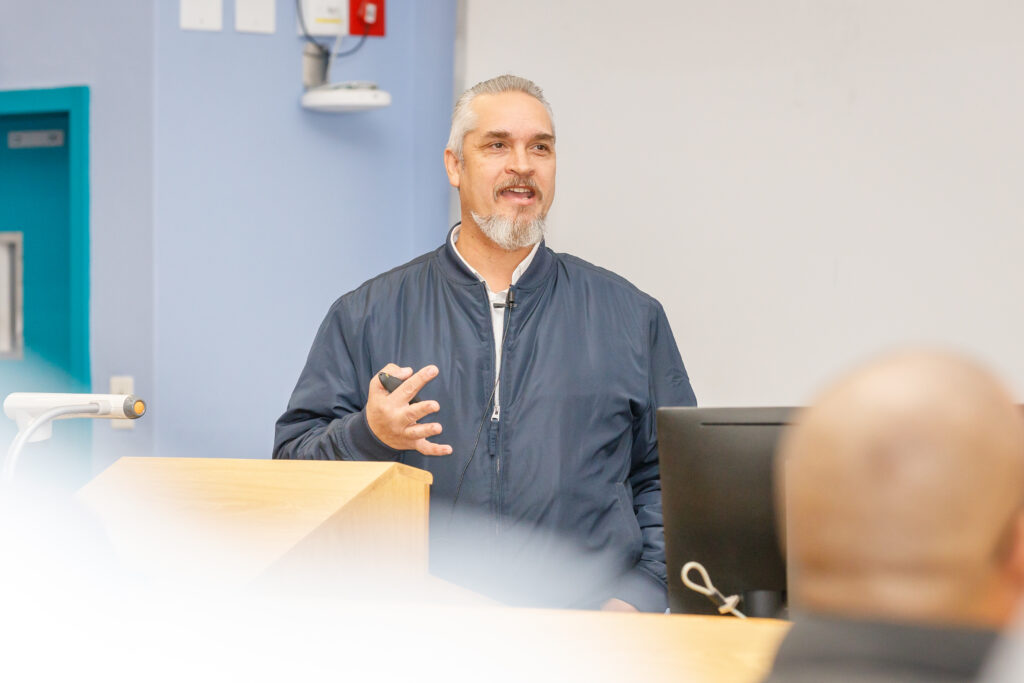
Sebastian Gelderbloem, the Stakeholder Engagement Manager for the Western Cape Provincial Department of Health in South Africa.
While challenges exist in South African healthcare, significant strides have been made in terms of community involvement – especially in stakeholder engagement, where SA is ahead of many other countries in the world. This is the opinion of Sebastian Gelderbloem, the Stakeholder Engagement Manager for the Western Cape Provincial Department of Health in SA.
When it comes to stakeholder engagement in the healthcare environment in South Africa, the country is actually leading the conversation in many areas, says Sebastian Gelderbloem, Stakeholder Engagement Manager for the Provincial Department of Health in the Western Cape. Speaking at the Africa Centre for Inclusive Health Management (Africa Centre) PgDip Winter School 2025, Gelderbloem said the Provincial Department of Health had evolved significantly over recent years to involve and collaborate with local communities on healthcare services.
For the first time in 25 years, the Africa Centre for Inclusive Health Management at Stellenbosch Management invited community health groups from Manenberg, Gugulethu, Langa and Khayelitsha as well as different sectors of the South African National AIDS Council (SANAC) Provincial Civil Society Forum in the Western Cape, to participate in its PgDip Winter School. This was welcomed by students and guest speakers and deeply appreciated by the 32 community health leaders and advocates, most of them women with many years of community health research and activism.
Gelderbloem said, “We’ve come a long way when you think of how we had to fight for freedom against apartheid, which in itself required an inclusive conversation to bring about change. So I don’t agree with the statement that we are behind other countries when it comes to stakeholder engagement, increasingly, we are involving stakeholders in planned projects before decisions are made.”
This will be music to the ears for many who remember costly and embarrassing mistakes in healthcare, like the failed R68-million clinic that had to be abandoned at New Eersterust near Pretoria, following protests by community members. The site is currently a dumping ground.
“When we talk about stakeholder engagement, community engagement is actually the most important one,” says Gelderbloem, who has been in his position for almost five years. “It is about involving community members and positioning them at the centre of the decisions we make in terms of healthcare delivery.”
One of the most effective ways this is achieved, is to initiate conversations with influential and interested members of communities, focusing the conversation on what they would like – as opposed to what an organisation or department wants to give them.
“We need to ask what is the need; that is how we open the door to being more inclusive.” While this may sound simple, the reality is far more complicated. Gelderbloem explained that differences in background and culture, around language and levels of education and power often clouded the dynamics in these conversations. It was important to get this relationship right, however, as it was when all parties worked together, that programmes actually succeed.
For anyone who wondered how about engaging stakeholders in communities, he spelled it out. “So before you plan your initiative, you have to create a list of all your stakeholders, then map them out so that you know who has more power or influence or interest in the project’s outcome. You want to prioritise the people who have a lot of power or interest because you want your project to be successful.”
Then, he says, you have to decide on the method of communication; if it is email or the media, community meetings or discussion groups. “It is important to understand what strategy you will follow and how you will give feedback on the process.” He added that often these processes took months, to get all the necessary parties involved, informed and pulled into the process. He said the monitoring and evaluation of a project was also important, as well as providing feedback on that to the community.
He concluded, “The collaborative approach is really the best way towards ensuring project or programme success.”
